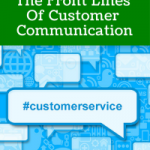Like it or not, AI is part of the marketing conversation now, and it’s not going anywhere. Many marketers have fully embraced it, while others have resisted the trends. There’s a good chance you’ve seen the parade of terrible AI content that plagues our social media feeds today and thought, “I don’t want to be a part of the problem.”
Don’t worry, you’re not alone.
Here’s the reality: AI is a part of the future of marketing, and we will all need to embrace it. But that isn’t necessarily a bad thing.
Using AI For Good
The conversation around artificial intelligence online can be quite toxic, and for good reason. Thanks to AI, social media platforms are swamped with garbage content these days. But in the hands of a capable marketer (that’s you!), AI can be a powerful tool that enhances your work.
I think a big part of the problem lies in where people focus. Things like generated images and videos may be flashy, but they’re still completely impractical for any serious work. These features overshadow the genuinely useful (if also mundane) applications of AI.
Let’s reframe the conversation, shall we? AI isn’t a replacement for a human writer, designer, strategist, or anything else. It is a tool that you can use to make your own work better. Take copywriting for example. If you ask ChatGPT to write an entire blog for you, it’d probably be a little dull, and might not entirely make sense when you read it through.
But now consider a human copywriter who’s hitting a wall. Or perhaps they have an idea that they just can’t get onto the page (we’ve all been there). AI writing tools could help this writer find the words they’re looking for, or inspire them to write something they wouldn’t have thought of otherwise.
Take AI For What It Is
We often hear that AI is the future and that it will revolutionize… well, everything. Tech companies love to talk like this about their AI models. The truth is that AI is far from perfect, but that’s okay. Perfection isn’t the goal — usefulness is. And even in its current form, AI can be incredibly useful for marketers.
Acknowledge AI for what it is, with both its benefits and its faults. When you do that, it becomes much easier to see it as a practical tool that can be genuinely useful in your work. It’s not here to replace you – it’s here to help you be even better at what you do.
So, the next time you’re faced with an AI tool, don’t run for the hills. Instead, ask yourself: “How can this make my work better?” You might be surprised at the answer.






